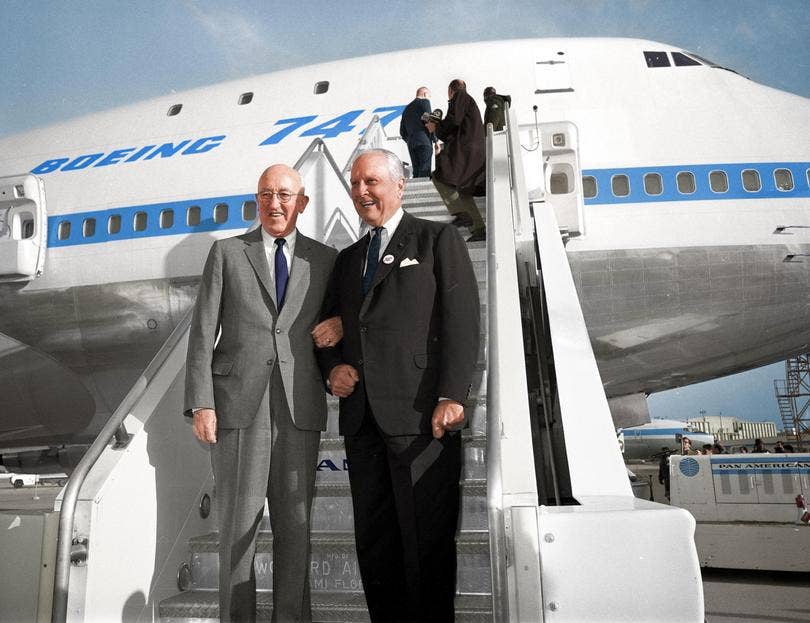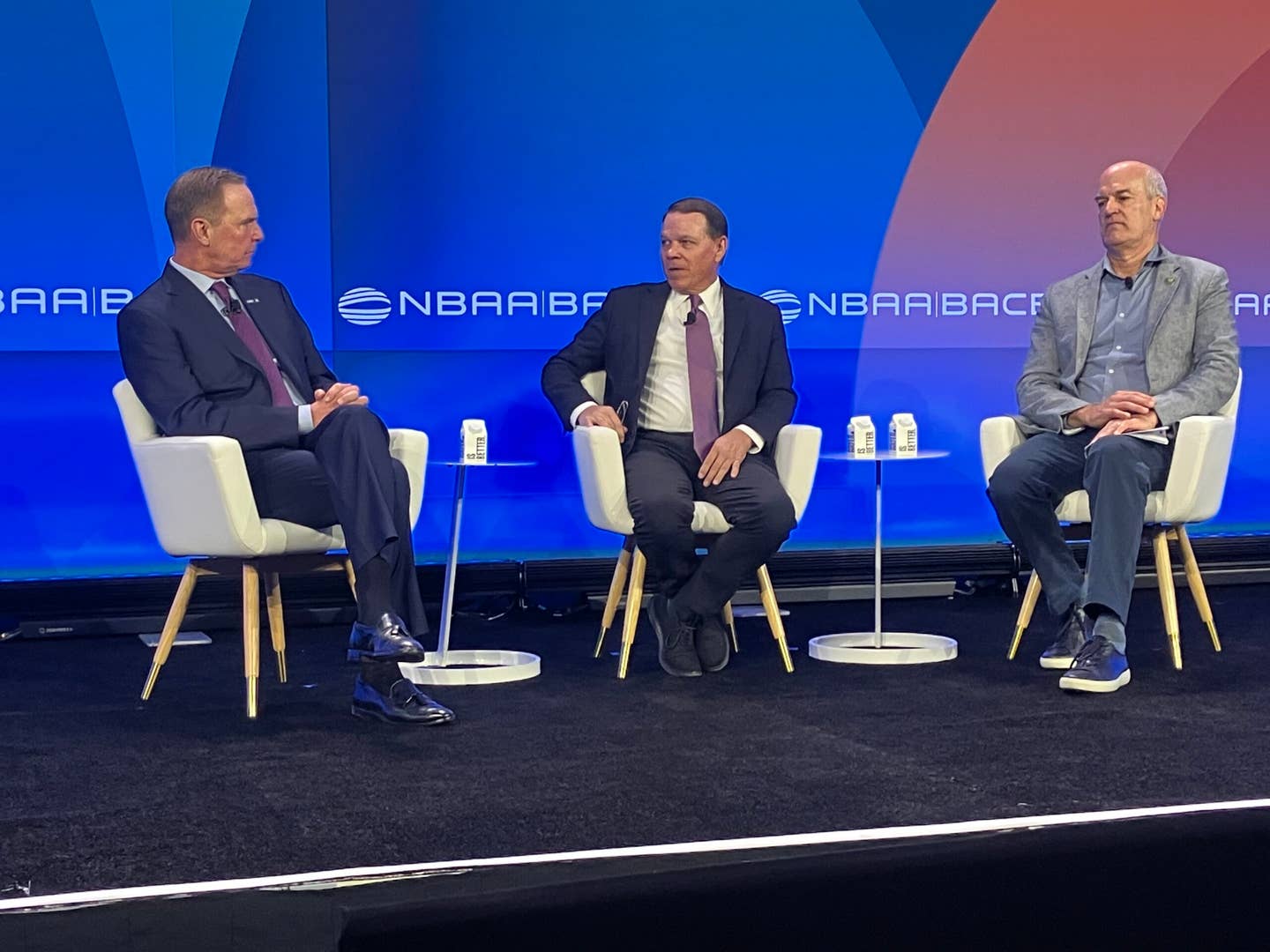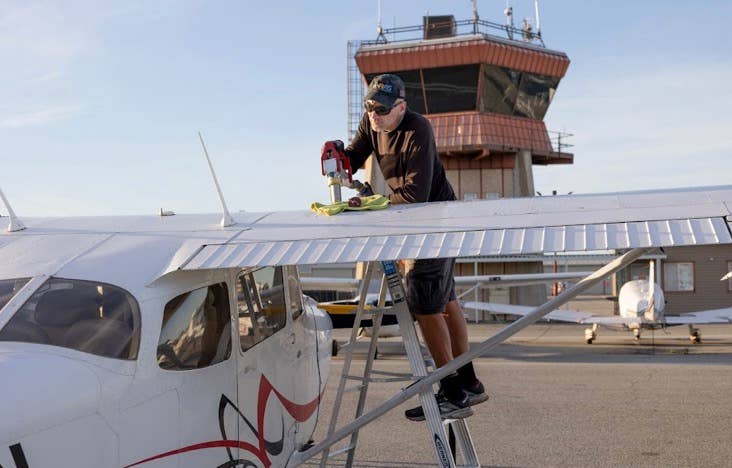Generations Later, Boeing Pride Still Runs Deep
Pride in Boeing runs deep but it’s skipped a few generations.

gen first jumbo to Perth – The men who launched the 747 – LR Boeing’s Bill Allen and Pan Am’s Juan Trippe. Credit Boeing Historical Archives colorized by Benoit Vienne
I lead a double life and in my other manifestation I am but a humble merchant who hawks his wares at a public market in a little mountain town that is crammed with tourists every summer. Our little winery seems to make products that those enjoying the clean air and drop-dead stunning landscape like to add to their experience. Therefore, every Saturday morning from April to October I lug about a thousand pounds of wine, a tent and my computer an hour over a mountain pass and do some business.
Although airplanes and wine seem like disparate paths I am amazed at how they often intersect. It seems like whenever I go to an aviation event all anyone wants to talk about is wine and vice versa.
So, inevitably my aviation life became a topic of conversation with the charming young lady who sells naturally dyed clothing on the patch of pavement next to me every Saturday. Joanne (not her real name) brightened instantly when I told her that my computer was open to my other world (borrowing free Wi-Fi from the hotel whose parking we were taking). It turns out that she's Bill Allen's great-step-granddaughter.
Now many of you recognized that name instantly. For those who didn't, Allen was the legendary president of Boeing who ushered in the jet age and brought the B-47, B-52, 707, 720, 727, 737 and 747 to market first as president from 1945 to 1968 and then as chairman until 1972. It would be hard to imagine a single person whose decisions have made a larger impact on the whole world and especially the world I occupy to deliver these words.
Now, Joanne, who wouldn't know a rudder from a spoiler, wasn't even born when Allen died in 1985. But she was able to list off his accomplishments in a torrent of pride that showed how deeply Boeing runs through her family tree even to this day. It was a pride shared with the thousands of skilled engineers, line workers and pilots who gave form to Allen's genius of forging a market that had never existed before. Although Boeing wasn't the first to fly a jet airliner, it caught up fast, and I think we can confidently call Allen the father of modern jet air travel.
And for clarity, Allen was a lawyer. He was not a pilot or engineer and he knew his place. He honored and fostered the skills and passion of all those people in the collective effort to shrink a world by orders of magnitude for civilians. That same technology was also used to project the power of the nation that made such an effort possible. Today, he would be appalled at what has become of his legacy.
By all accounts Boeing has traded that pedigree of innovation and brilliant execution for a cost-conscious model that puts shareholders at the top and pits employees and whole departments against each other in a race to the bottom. It's one of those "too big to fail" companies that has forgotten that there is no such thing.
The horrible missteps of the past decade, including the recent door panel exit, have made the world's biggest engineering and manufacturing company a punchline on late-night television. So far, the traveling public continues to get on board the ubiquitous Boeings but honestly, how many more mishaps will it take to change that?
The current situation has been predicted for decades since Allen retired and a series of mergers and acquisitions turned Boeing into a stock market listing instead of the world leader it has been and should be.
Several decisions have been milestones on that journey. There was moving the head office to Chicago (Chicago?) and more recently the outskirts of Washington, D.C. There was also the creation of a branch plant in the right-to-work state of South Carolina to build its current flagship 787, which infuriated the deeply entrenched union staff in Seattle.
But more than anything, it was the sale of its key manufacturing facilities in Wichita to Spirit Aerosystems that had aviation pundits wagging their fingers 20 years ago at the number-crunchers who saw cost savings in contracting out construction of the biggest part of the airplane.
Spirit builds the fuselages of the 737 MAX in the former Boeing facility and ships them by rail to Renton, Washington, for final assembly with other parts that have been built all over the world. The door plug that blew off on Jan. 5 was built in Malaysia, but it wasn't to blame.
Boeing and Spirit workers combined for a manufacturing debacle that began with shoddy rivet work in Wichita and ended in Renton when bolts that hold the door plug in didn't get installed. At this point it's hard to determine which facility is worse, but Boeing has apparently decided it's Spirit's so it's trying to buy its old plant back.
There are some positives to the plan. One of the issues with the airplane that came to be operated on Alaska Flight 1282 was that Spirit's manufacturing record system is completely different from Boeing's. Presumably the acquisition would fix that and maybe help the hordes of FAA inspectors, who will be monitoring every move that Boeing makes for years to come, with their paperwork.
But there's a lot more for Boeing to do to fix this than buying out a scapegoat. From what I can tell, the front office malaise that first infected Boeing decades ago has sickened the whole company. Unraveling all that will take the kind of leadership that has apparently been absent in that time.
Meanwhile, let me tell you a little more about Joanne. She was pregnant with her first child when I stumbled out of my car at the crack of dawn (farmers' market folks apparently don't need to sleep) and started setting up for market day beside her for the first time last April. As her future family grew she never missed a market and she never complained about the physically demanding tasks at hand. At the same time her product line expanded and improved in quality and her many friends and other market vendors were never far away if she needed help, which she never did.
As the big day drew near we all just assumed she would literally fold her tent and get on with creating a family, but she was always there. One morning in September, she and her husband pulled in and I jokingly said: "Shouldn't you be having a baby?" She glanced up and said: "I had him," and out of the car came a baby carrier with an impossibly tiny five-day-old miracle who made his debut at the market. They set up quickly and efficiently as always and never missed a beat for the next few weeks as the market wound down for the season.
Little William did his part and stayed at the market with his mom, with Dad adding backup as required. He drew attention to the normal needs of newborns but otherwise napped and generally didn't create a fuss. I think his great-great-grandpa—and namesake—would have been proud but not surprised.






